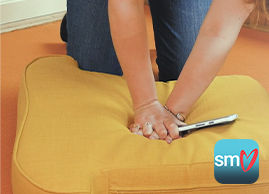We constantly hear that core strength is fundamental to athletic performance, reducing injury risk and living a healthy life. But what most people don’t realize is that the psoas and ilicaus muscles are also considered muscles of the core. Like the other muscles that make up the core, if the muscles that act at your hips are not in good health, you'll soon know about it.
Back pain, knee pain, shin splints, IT band friction syndrome, plantar fasciitis, and all sorts of other aches and pains often stem from the hips.
It’s the muscles around your hips that support your torso and pelvis, creating a strong foundation for your limbs to move from. When these muscles (primarily the psoas, iliacus and the gluteus maximus) are not in good shape, you don’t have the strong foundation you need, which means that other parts of the body have to pick up the slack. When these other muscles do too much compensating, overuse or repetitive stress injuries can soon result.
“Stretching and strengthening my hips helps me feel confident in any movement. I know I have much less likelihood of injuries.” –Kelly MacDonald, Personal Trainer and LES MILLS STRETCH™ creator
By strengthening the muscles around your hips, not only can you ease injury risk, but it also improves your athleticism. Building strong glute muscles and strengthening and stretching your hip flexors helps you transfer force through the upper and lower body, so you can move more powerfully. That means running faster, jumping higher and performing better.
Ask Bryce Hastings, physiotherapist and Les Mills Head of Research, about the most beneficial stretches and he says, for many, focusing on your hip flexors is hard to beat. “We only have 10-15 degrees of extension available at the hip (where the thigh moves behind the body) and we use all of this mobility every time we take a step. Compare this to the hamstrings, which normally allow 90 degrees of hip flexion, of which we only use around 30 degrees when we walk or run. Therefore, losing 10 degrees of hamstring length is generally O.K., whereas losing 10 degrees of psoas length is a real problem. Any shortening of this muscle shunts movement that should occur at the hip into the lower back during each step, and that’s a disaster.”
If you have tight hips, you have less mobility, which can make even the simplest movements—like walking or pushing a stroller—painful. Tight hips can also lead to a tilted pelvis, which affects both your posture and your head and neck alignment. Poor posture is linked to stress and depression, while neck alignment issues can lead to headaches.
Post-pandemic Hip Health is More Important Than Ever
While we know the perils of too much sitting, for many, pandemic-induced restrictions have meant we’re spending more time than ever at home working and sitting on our bottoms. A recent study identified prolonged sitting as one of the key causes of pain and discomfort caused by limited hip extension. Your hips are contracted whenever you’re sitting, and your hip flexors (the large powerful muscles at the front of the hip) are in a shortened position. In as little as 30 minutes, this tightening of the muscles can become problematic. You experience a loss of elasticity in the muscles, and as you age, this can become more pronounced and the muscles become less pliable.
Signs You Need to Stretch Your Hips
Personal Trainer and LES MILLS STRETCH™ creator, Kelly MacDonald says: “We know it’s important to drink water, brush our teeth and get five-plus [vegetables and fruit] a day to maintain our health. It’s just as important to stretch, especially the hips, as they’re the center points of your body that take a lot of load daily.” She adds that if you’re dealing with any of the following situations, you will definitely benefit from stretching your hips.
- Sitting for any more than four hours a day
- Lower back or knee pain
- Any pinching or pain in your hips
- A feeling of being restricted when you move
- If you struggle to touch your toes.
Are Your Hips Holding Your Emotions?
It’s not just your physical body that benefits from strong hips, your hip health can affect your emotional well-being, too. While there is a fair bit of controversial and wide-ranging thinking on this topic, has shown that people link different emotions to different areas of the body, and the hips are where some people perceive to hold a lot of emotional stress. While the connection between feelings of stress and where it is experienced in our bodies needs to be researched further, there is no doubt that the physical, emotional and environmental stressors we all experience can impact the way we live.
With this in mind, the sun salutations, pelvic stretches and hip opening postures you do in yoga and BODYBALANCE™ sessions may not only release physical tension but ease mental tension as well.
And, of course, yoga isn't the only option. Lunges and squats are all beneficial for hip health, as is stretching. If you want to take action and enjoy the benefits right now, you can join Kelly MacDonald for a 15-minute LESS MILLS STRETCH Hip Mobility session.
This article originally appeared at www.lesmills.com/fit-planet




 by
by 






 by
by